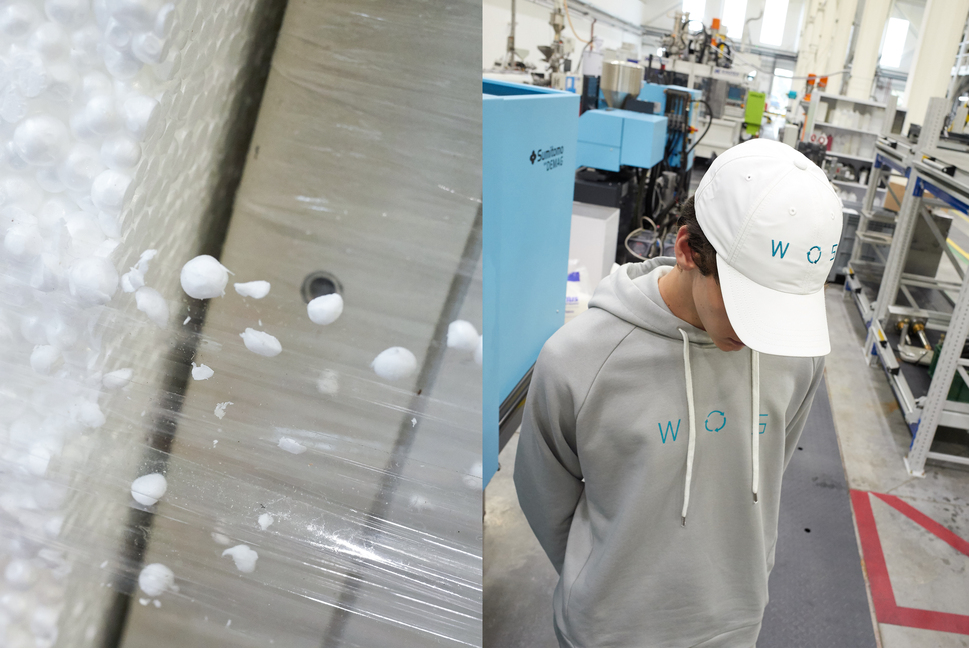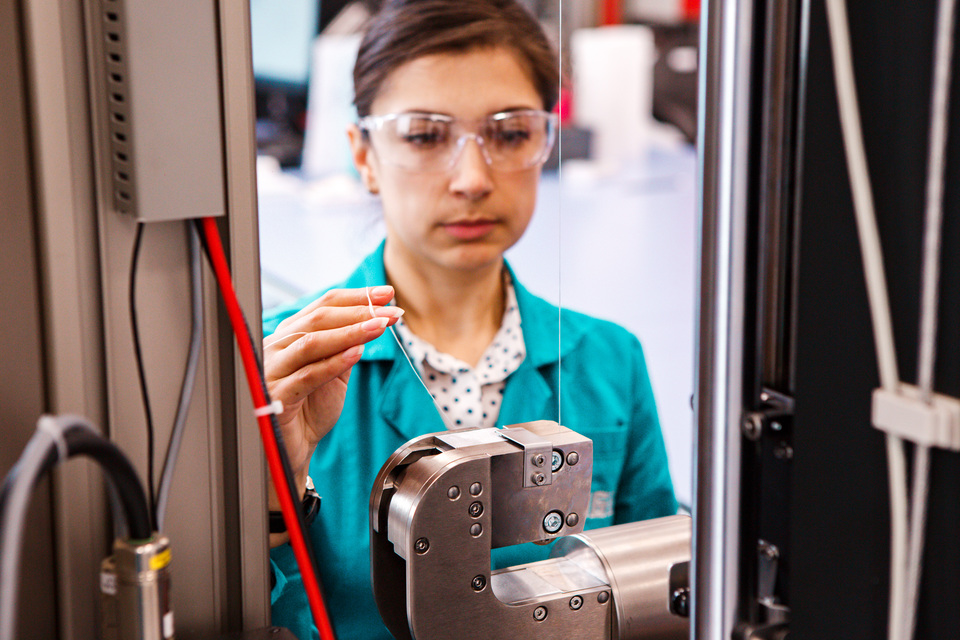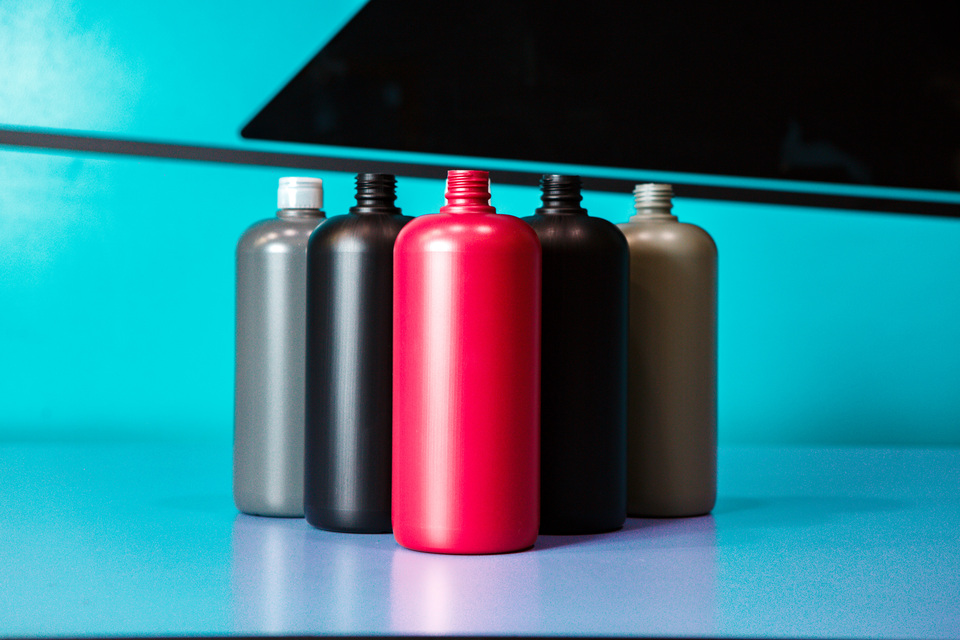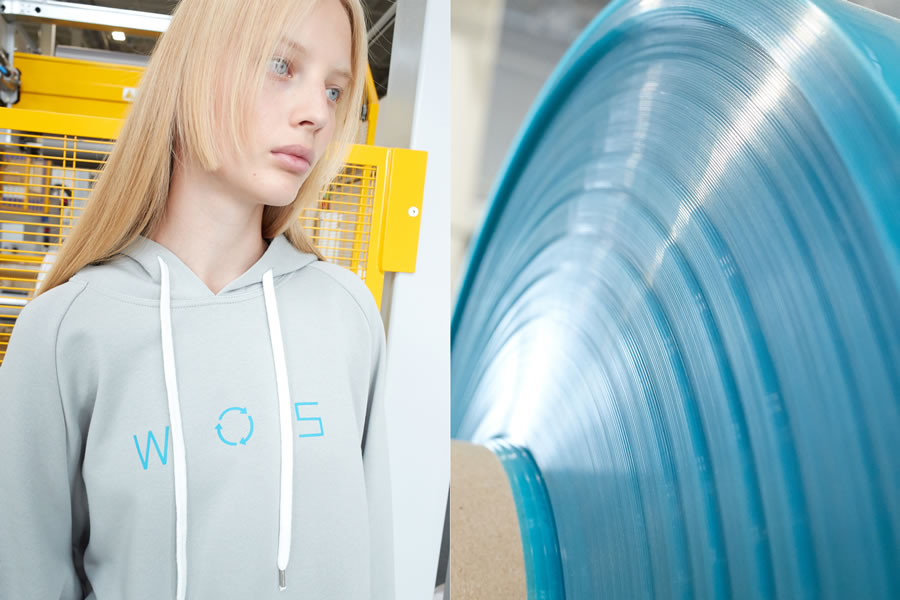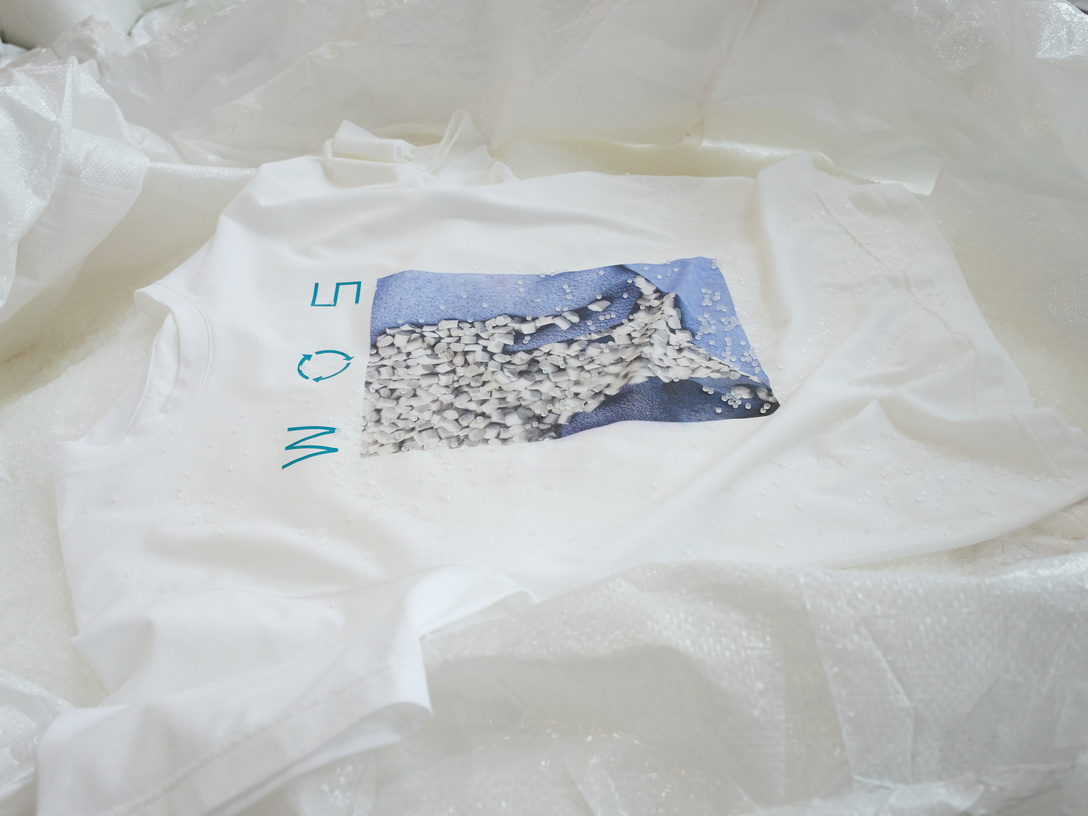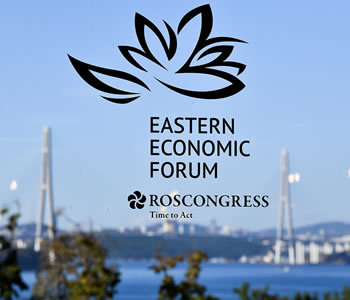The WOS brand’s philosophy is rooted in sustainable development and responsible production. For this reason, its collaboration with SIBUR is only a natural step, as we also advocate for responsible consumption and the recycling of plastic. It is safe to say we share the same values. And this gave the world another example of how two seemingly vastly different industries – fashion and petrochemicals – are able to team up.
An eco-friendly success story
This partnership marks the first time that an industrial major of this size has collaborated with Andrey Artyomov, a Business of Fashion 500 designer and the founder of WOS. The collection was developed in collaboration with SIBUR PolyLab, the Company’s R&D centre at Skolkovo. From managers to engineers, chemists and more, almost every member of the SIBUR PolyLab team attended the first meeting with WOS; and according to Andrey Artyomov, the researchers showed huge interest in the project.
The capsule collection leverages high-tech fabrics made from recycled plastic, which are not inferior to traditional fabrics in terms of quality or performance. We placed a bet on versatility and durability: two classic qualities that are relevant regardless of the latest fashion trends. With their basic colours and simple silhouettes, items from the collection can easily fit into any wardrobe. All the same, the collection is trendy, as eco-friendliness and responsible consumption are becoming a new way of life.
The collection skyrocketed in popularity even before it hit the shelves: the collaboration made waves in the fashion world and in Telegram channels.
Every leading fashion media outlet in Russia, including Vogue, has covered the collaboration project between SIBUR and WOS from as early as its announcement
Every leading fashion media outlet in Russia, including Vogue, has covered the collaboration project between SIBUR and WOS from as early as its announcement. The interest was genuine: this kind of partnership is a first for Russia, which has never before seen an exclusive clothing collection sewn from recycled fabrics in the luxury segment. The collection skyrocketed in popularity even before it hit the shelves: the collaboration made waves in the fashion world and in Telegram channels, and the publication of the lookbook drove even more hype, with eager shoppers queueing up on the WOS website to get their hands on the trendy and eco-friendly items.
What do we have to work with?
We planned to manufacture the capsule collection using raw materials that SIBUR produces from recycled polymers. However, prior to its collaboration with WOS, SIBUR had no experience with textile manufacturing. As a result, issues arose throughout the development process that took time to resolve and called for new knowledge from the team of scientists at SIBUR PolyLab.
The process of recycling polymers into fibre filaments is split into several stages. Used PET plastic (e.g. bottles) must be sorted, washed, sterilised and dried. It is then shredded into flakes, formed into pellets and dried again. Afterwards, the pellets are melted and passed through a very fine filter. On the surface, it all seems quite straightforward.
Producing filaments from recycled polymers increases the price tag: the resulting fabric can cost the same, and usually more, than those made in the traditional way.
The clothes from the WOS capsule collection are packed in reusable bags made of Vivilen, an innovative material developed by SIBUR PolyLab that helps drive the circular economy
But in order to create filaments suitable for durable, high-quality, safe and comfortable fabric, they must be spun or extruded in a special way, with additional materials added. Here is a simple example: after a number of washes, low-quality clothes start to go shiny. To avoid this, you have to add a material; and to increase durability, you have to add another. The process of manufacturing filaments is a whole different area of science and a whole different industry. Dyeing recycled filament comes out more expensive than conventional polyester filament. Because of this, producing filaments from recycled polymers eventually increases the price tag: the resulting fabric can cost the same, and usually more, than those made in the traditional way.
When it became clear that, for the time being, they would not be able to resolve this challenge on their own, SIBUR and WOS began searching for manufacturers able to produce filaments and fabrics for the future collection. Unfortunately, there are practically no players in Russia capable of handling this task at the required level, so we had to turn to foreign contractors. Ultimately, orders were placed with a number of certified suppliers in Portugal and Hong Kong.
Still no options to choose from
The fact that Russia needs domestic producers of synthetic fibres and fabrics for light industry was discussed at the St Petersburg International Economic Forum, which was held in June this year. Andrey Artyomov was invited by the Ministry of Industry and Trade of the Russian Federation (Minpromtorg) to speak at the session Total Fashion: Integrating Fashion and Industry.
“Russian designers are calling out for synthetic fabrics,” he said. “And we are willing to buy them domestically if they are a decent and competitive quality, if they are affordable and if they are manufactured on time and in the required volumes. It would be cool and exciting for designers, because they would have reduced logistics costs.”
SIBUR’s production of pellets for packaging solutions is well-established. To meet the fibre segment’s needs, we need to either build new capacity or upgrade existing capacity.
The brand encompasses eco-friendly solutions for blow moulding, injection moulding and heat shrink film production – all using recycled materials. This solution answers the green trend and is unrivalled on the Russian market
The Ministry of Industry and Trade of the Russian Federation is already in negotiations with petrochemical companies on this matter, and SIBUR is one of them. Alexander Petrov, Member of the Management Board at SIBUR, identified the core problem as the fact that demand for synthetic fibre and filament from Russian manufacturers of fabrics and yarns is currently markedly lower than import volumes.
“This is the fundamental problem holding back the growth of raw material production for light industry in Russia. Any investments should be effective and should pay off,” he said. “SIBUR’s production of pellets for packaging solutions is well-established. To meet the fibre segment’s needs, we need to either build new capacity or upgrade existing capacity. If we notice the prerequisites for the growth of domestic demand for fibres and filaments emerging, we are ready to consider directing investments into these kinds of projects.”
Natural selection
Today’s consumer has a one-size-fits-all opinion: “When it comes to materials, eco-friendly equals natural.” We can mention cotton, linen, natural silk, etc., and up to a certain point, this indeed used to be the case. The journey from plant to garment was long: the plants needed time to reproduce and nature was able to “dispose of” the remnants of clothes that had become unusable. But the growth of consumption up-ended everything. Huge areas of land are now required to grow commodity crops, and forests are being cut down for them. The crops need to be fertilised, protected with pesticides and watered. The amount of resources spent on this are enormous.
A single kilogramme of cotton requires twenty thousand litres of water, and from this kilogramme, you can make a single T-shirt. Outfitting the whole planet in organic cotton, which is definitely eco-friendly, simply will not happen. There are many nuances to organic farming that can be boiled down to one thing: it is expensive.
91% less energy is needed to recycle a kilogramme of plastic than a kilogramme of paper. It is crucial to consider the entire life cycle of a product when gauging its eco-friendliness.
As a leader in pushing forward an ESG agenda in Russia, SIBUR is directing huge efforts towards developing the circular economy, a goal that is formalised in its Sustainability Strategy. WOS is the next logical step in this story
The exact same can be said of packaging. A paper bag is no more eco-friendly than a plastic one. Out in nature, they can decompose faster, but their production causes much more significant harm to the environment. Paper production is energy and resource-intensive and a very “dirty” process compared to plastic. The same applies to waste paper recycling: 91% less energy is needed to recycle a kilogramme of plastic than a kilogramme of paper. It is crucial to consider the entire life cycle of a product when gauging its eco-friendliness.
That is why the clothes from the WOS capsule collection are packed in reusable bags made of Vivilen, an innovative material developed by SIBUR PolyLab that helps drive the circular economy and gives polymers a new lease on life. Vivilen packaging consists of 50% recycled plastic, and it can also be recycled after use. The brand encompasses eco-friendly solutions for blow moulding, injection moulding and heat shrink film production – all using recycled materials. This solution answers the green trend and is unrivalled on the Russian market.
WOS is committed to ethical production, promoting eco-cotton and only choosing factories with a proven track record of ethical behaviour.
All the proceeds from the sale of the WOS collection, created with the support of SIBUR, will be donated to the Second Wind Charitable Foundation. The charity collects clothes and gives them a second lease on life
“The new generation does not have a distrust of synthetic materials as the older generation does. Artificial fabrics are increasing in demand among young people. They have a deeper understanding of both conscious consumption and sustainable production. They truly care about the environment and the future of the planet,” Andrey Artyomov explains.
WOS is committed to ethical production, promoting eco-cotton, only choosing factories with a proven track record of ethical behaviour and producing its clothes hangers and part of its packaging from recycled materials. Andrey’s team proves time and time again that the fashion industry can, and should, act ethically, and even small steps in this direction make a difference. Plastic is not waste. Recycled materials are the future of the fashion industry, something that Andrey believes wholeheartedly.
Granted, there are a currently a number of restrictions that prevent light industry from transitioning to recycled polymers en masse. As mentioned above, this is primarily driven by cost. Also, the question of how to recycle clothes from these kinds of fabrics is yet to be addressed. A single plastic bottle can be recycled a dozen times. But in items of clothing, polymer filament is most often connected to other materials; for example, cotton. To recycle it, the material must first be broken down into molecules to isolate the polymer. These kinds of technologies are currently unavailable on an industrial scale. But that is just a matter of time.
The lookbook for the SIBUR and WOS joint collection was shot at SIBUR PolyLab by the famous photographer Bogdan Shirokov. A T-shirt from the collection features one of his photographs printed on it: a shot of our recycled plastic pellets.
Offering a second wind
SIBUR’s partnership with WOS has shown that there are blind spots in the production of fibre and fabrics from recycled materials in Russia, and this is actually a big step: accepting that the problem exists spurs us on to find a solution for it.
For SIBUR, our collaboration with WOS became the starting point for the development of new technologies and the search for partners in the textile industry. By and large, the project turned out to be a real investigation, and SIBUR will continue R&D in this area, as the potential for using fabrics made of recycled polymers is boundless – from casual wear to collections from fashion houses.
As a leader in pushing forward an ESG agenda in Russia, SIBUR is directing huge efforts towards developing the circular economy, a goal that is formalised in its Sustainability Strategy. WOS is the next logical step in this story.
The proceeds from the sale of the collection will be used to develop an ambitious awareness-raising programme to help roll out the collection, redistribution and recycling of textiles across different regions of the country.
It is also important to note that all the proceeds from the sale of the WOS collection, created with the support of SIBUR, will be donated to the Second Wind Charitable Foundation. The charity collects clothes and gives them a second lease on life. For example, it sends them out into the Russian regions to people from socially vulnerable groups as a form of humanitarian aid. Some of the clothes collected by the charity are put back into productive use in the economy and some are recycled. Second Wind is practically the only charity in Russia that is currently developing infrastructure on this scale for collecting unwanted clothes all across the country, including through partnerships with regional projects.
The proceeds from the sale of the collection will be used to develop an ambitious awareness-raising programme to help roll out the collection, redistribution and recycling of textiles across different regions of the country – another important step towards the development of the circular economy in Russia.
At the end of October the joint capsule collection by SIBUR and WOS went on sale. You can place your order on the collection's website as long as items are in stock.
Download PDF

